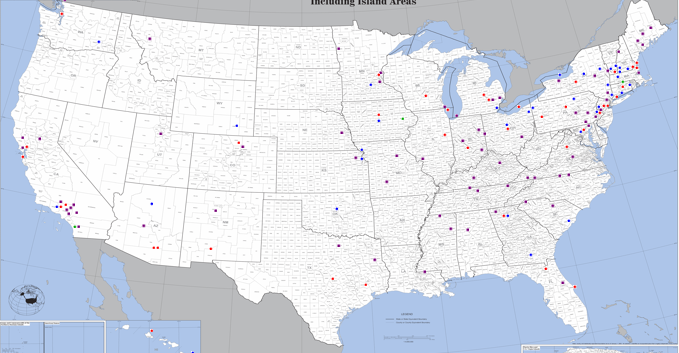Dimitri Veras, a postdoc at IoA-Cambridge, has created maps of Astronomy institutions in the US, Canada, and Australia. Mousing over the symbols reveals the number of majors and grad students in the department and the population of the city the department is located in. The symbol meanings are different on each map, but the primary astronomy institutions are marked with red filled circles on all three. This could be a great tool to help graduate school applicants and job hunters scope out institutions!
Dimitri wants to create complete maps for as many countries as possible, so if you know of good sources/lists for data for relevant departments, please leave a comment below or get in touch with Dimitri directly: dimitri.veras@colorado.edu.

The map doesn’t include Physics and Astronomy programs so it will mislead anyone who tried to make use of it.
For the US, I don’t think that’s true. Isn’t one of the symbols for Depts with “astro” in the dept name? Also, if there are joint depts (or Science, Engineering, or Planetary Science, etc depts) with a significant Astro presence, I think Dimiti would be happy to add it to the map.
In my very informal survey, the map seems to miss physics departments with significant astro components. For example: Stanford University and Carnegie Mellon University.
Thanks for your comments. As indicated in my description on the website, my initial search for the U.S. departments included only those which were designated by the American Institute of Physics (AIP) Statistical Research Center as being “degree-granting astronomy departments” or that I’ve discovered to have “astro” or “planetary” in the department name.
As I’ve also indicated, I’m happy to include departments with strong astro components that don’t fit into these categories, so please keep the suggestions coming! Right now my list includes:
Arizona State University
Carnegie Mellon
Catholic University of America
Fisk
Notre Dame
MIT
Montana State
Rice
Stanford
Texas A&M
UCSD – CASS
Was going to say that apparently I’m in a PhD program at an Ohio university in Michigan with no graduate students, but using the Firefox version put the dot in the correct location.
At least I can correct that Toledo does have a PhD program (physics PhD, concentrating in Astrophysics), with 18 graduate students
There is an “astrophysics” program at New Mexico Tech in Socorro, NM. For political reasons w.r.t. UNM and NMSU, Tech can’t call their degree astrophysics, so it’s called Physics with an Astrophysics Option. The kicker is Tech usually graduates more astrophysics students each year than UNM and NMSU combined. http://www.nmt.edu
Joseph and Craig: Thanks, I’ll add both Toledo and New Mexico Tech to the list!
Several of the University of California campuses are missing. There are strong astronomy programs at UC Davis, UC Santa Barbara, and UC San Diego that are not shown. And Harvey Mudd College and Virginia Tech are also missing, both of which have astronomy groups within their physics departments.
That’s great, thanks. I have been able to find websites for all 5 of the institutions that you mentioned.
I’ll wait until the end of the week for any more suggestions, and then add all the programs together to the map that didn’t register in my initial search criteria.
All of the ANU Research Schools should be listed as in Canberra – that’s probably more helpful than saying which suburb of Canberra they are located in. Also, the Research School of Earth Sciences has a planetary group.
In the Canada map, the University of Toronto is listed as being in Alberta.
@Alex: Thanks for the correction!
@M.T.: I agree, I’ll change Acton and Weston to Canberra. As for the Research School of Earth Sciences, I notice now that it jointly runs the Planetary Science Institute with the Research School of Astronomy and Astrophysics. So including all three might be a bit redundant, but they all seem to be part of the university, and that’s probably the safest thing to do.
I have now made an update to the maps and have incorporated many of your suggestions. Thanks again.
Stony Brook University has >>0 grad students doing Astronomy – but their degrees are in Physics.
We also have >>5 undergraduate astronomy majors.